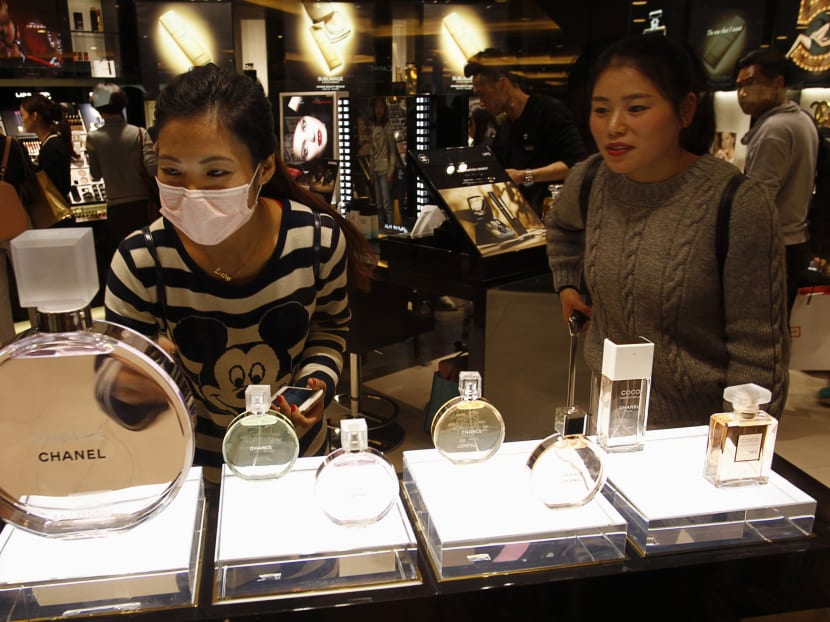Gone are the gifts as Chinese look to buy for themselves
BEIJING — To grasp how important Chinese consumers have been to the global luxury industry over the past decade-and-a-half, you just need to look at how badly sales have been hit by a ferocious two-year Communist Party clampdown on corruption and conspicuous consumption.

Chinese visitors shopping in a Hong Kong mall. Due to high luxury taxes and aggressive pricing strategies, luxury goods in China can be more expensive than the same item in Hong Kong, Japan or Europe. Photo: Reuters
BEIJING — To grasp how important Chinese consumers have been to the global luxury industry over the past decade-and-a-half, you just need to look at how badly sales have been hit by a ferocious two-year Communist Party clampdown on corruption and conspicuous consumption.
The chief executive of a leading Swiss watch company, who wished to remain anonymous, said that before the anti-corruption campaign, as many as 65 out of every 100 of his firm’s watches were sold in China. Today, only 25 out of 100 are bought by Chinese.
In 2000, Chinese consumers accounted for less than 2 per cent of global luxury spending in a worldwide market in which 140 million luxury consumers spent about €130 billion (S$197 billion).
By the end of this year, there will be more than 350 million global luxury consumers, and the Chinese will account for more than 30 per cent of their €230 billion in purchases, according to Bain & Co’s latest worldwide luxury markets monitor.
But that startling rise has slowed sharply in the past two years, after President Xi Jinping launched a campaign to cleanse the party and the government of rampant corruption.
For more than a decade, luxury goods from top brands had been regarded as favourite bribes for businesspeople to curry favour with party officials, who wield enormous power over economic activity in the authoritarian state.
As well as reducing overall purchases, the anti-graft drive has changed the way the Chinese consume luxury products.
“Since the start of the campaign, Chinese buyers have become much more focused on buying for themselves than for other people,” said Mr Stefano Canali, general manager of luxury menswear brand Canali.
He added: “They are much more demanding and want to know a lot more about what they are buying and why they should spend their money on it.”
Thanks to currency movements, high domestic luxury taxes and far greater international mobility, they are also choosing to buy luxury products abroad rather than in the retail outlets proliferating across China.
This is a problem for the purveyors of products such as French cognac, Swiss watches and Italian handbags, which have frantically expanded their store chains in China in recent years.
People in the industry say several large global luxury brands have closed boutiques in some of their more remote locations in China, and this trend is expected to continue.
“Western luxury retail in China is fading fast, and I predict many more luxury shops will have to close. There will be a lot more pain to come in the next two or three years,” said Mr David Tang, a columnist for FT Weekend and founder of several luxury brands including fashion house Shanghai Tang.
Mr Tang pointed out that about 60 per cent of Chinese luxury purchases are now made outside the country, and this flow is accelerating as tech-savvy consumers increasingly compare prices online.
Because of very high luxury taxes, greater costs for companies doing business in China and aggressive pricing strategies, luxury goods bought on the mainland can be far more expensive than the identical item bought in Hong Kong, Japan or Europe.
In 2000, most Chinese were unable to even obtain a passport, let alone a visa, but today, countries are falling over themselves to attract wealthy Chinese. At the same time, global travel is easier and cheaper than ever, market watchers point out.
Analysts note that exposure to foreign tastes on a massive scale has helped shift Chinese preferences from the desire for “bling” and ostentatious displays of wealth a couple of years ago, to a growing emphasis on understatement and quality.
The rapid pace of change in China makes it clear that the rich and easy pickings enjoyed by global luxury brands in the country for so long are mostly gone.
To succeed in this more austere environment, analysts say big brands need to focus on quality and working hard to attract the more discerning Chinese consumer.
Brands must also understand that the bulk of their sales will be made outside the country, so high-profile Beijing and Shanghai flagship stores will mostly serve as expensive marketing tools. THE FINANCIAL TIMES





